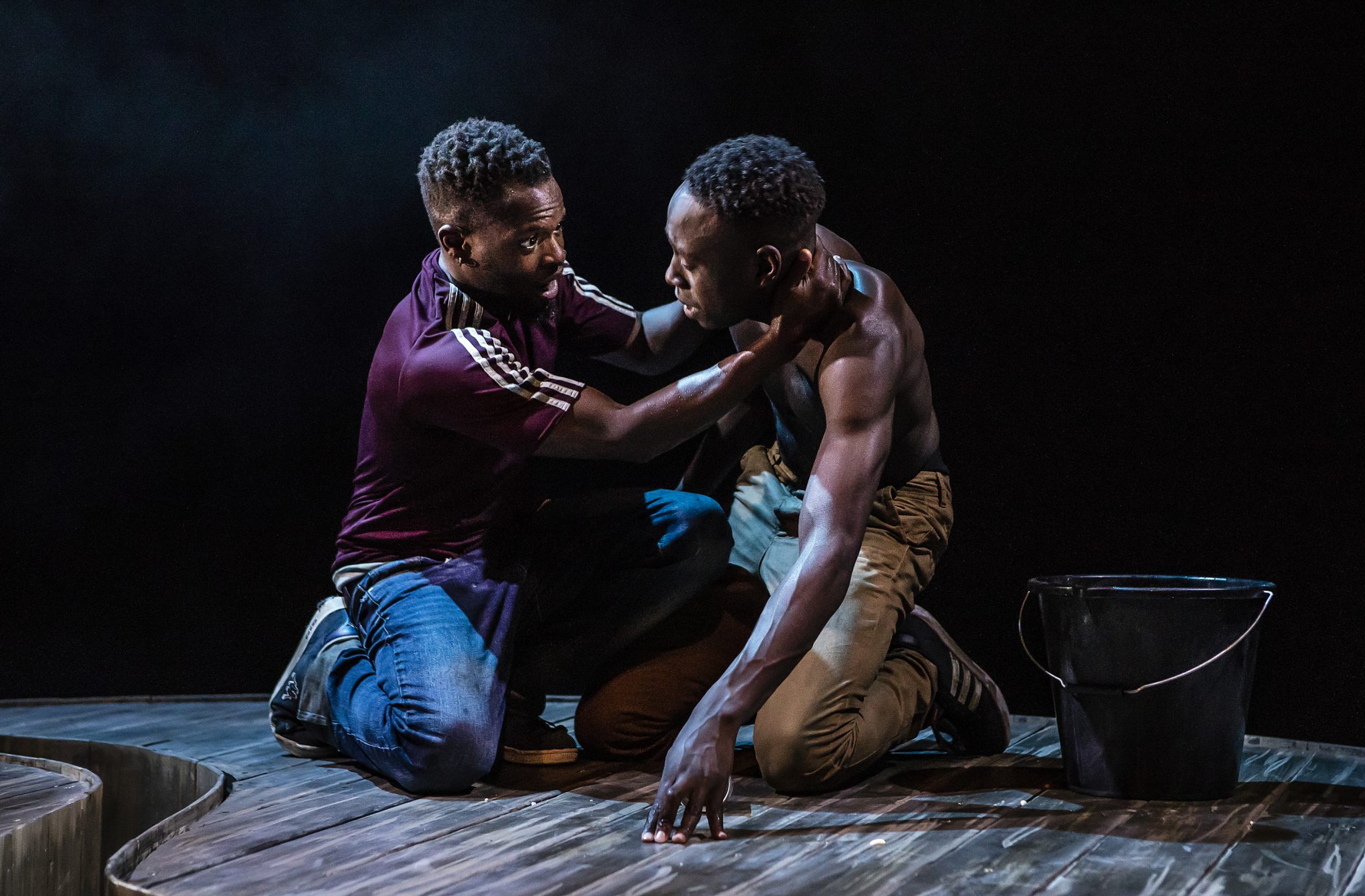Based on Chigozie Obioma’s Man Booker prize nominated book of the same name, The Fishermen is, on paper, a tale of brotherhood and the fracture of a family through tragedy. But it is also easily so much more than that.
As a play that focuses on the bonds and relationships of the family, an important feature of Nigerian culture, The Fishermen boils the action down to just two people – the youngest brothers, Benjamin and Obembe. Reuniting after 8 years apart, the two brothers reflect and essentially ‘act out’ memories from their childhood which change the course of their lives forever. As director Jack McNamara points out, the ‘siblings hold traces of their wider family within them,’ and so we still meet the other characters, but only through the lens of the two brothers. This careful morphing into each character is managed through subtle mannerisms such as the jutting out of a hip and disapproving wag of a finger to imitate ‘Mummy’ or a quiet stillness that evokes the father. Consequently, the brothers communicate their own personal tragedy through playing their family members, which further intensifies the dramatic heart of this play, as an encounter between siblings can quickly become a confrontation with one’s parents or other siblings.
Steeped in mystery and superstition, the dramatic arc of the play is almost biblical. Starting off with the homecoming of a long-lost son, to the Cain/Abel duel between the two eldest brothers and the neat circularity of the narrative (with the brothers ending the play as they began it, singing), the play is carefully plotted. Knitting it all together are the threads of an oral storytelling tradition with superstitions and beliefs that still clearly hold sway despite the authority of Christianity, and the overarching tension between a divined fate and one’s own free will. This is eerily personified in the character of Abulu, the village ‘madman’ whose dire warnings that Ikenna will die at the hands of one of his brothers sets the novel’s tragic plot in motion. This also serves as a catalyst for the brothers’ spiral into a web of distrust and suspicion, which rapidly pushes the story toward its climax, and results in the brothers bringing about their own fate. The climatic fight between the older brothers, Ikenna and Boja, is a memorable scene with actors rapidly shifting from abrupt movements to balletic slow-motion lifts and leaps. In this moment the stage is washed in darkness and the actors are illuminated in their stillness, which is mesmerising. Realizing that Abulu is the cause of conflict between the brothers, a gruesome revenge is planned, resulting in more tragic rifts.
The set allows for a raw performance, with Amelia Jane Hankin’s stripped back design giving the actors space to weave in and out of large metal poles that divide the circular risen stage area. These poles are sometimes used as props, and easily become fishing poles and nets and or even to conjure the image of the brothers snaking through a field. It is clear that collaboration has been at the heart of this production, and the dynamic between the two actors (Michael Ajao and Valentine Olukoga) is the show’s greatest success. They effortlessly bounce off each other, enabling them to smoothly transition from character to character. The choice of who doubles up which roles – such as oldest and youngest brother – also work well, bringing a circularity to the production. Ajao’s measured transitions from the eldest and serious brother Ikenna to the youngest and naïve Ben are moving. Throughout the play, we never forget the importance of brotherhood, whether this be through reminiscing over the taste of their mother’s Ogbono soup or the gentle teasing between brothers over Mary J. Blige. These tender moments make the latter stages of the story all the more heart-breaking to watch.
The story of Nigeria is also the heart of this play, with Gbolahan himself growing up in Nigeria until the age of ten, which is also the age of the book’s protagonist. This is captured through the use of language, mixing the traditional English novel form with the oral storytelling tradition, echoing the great Igbo writer Chinua Achebe’s Things Fall Apart. The narrative itself is set in 1990’s rural southern Nigeria, when it was under the military rule of General Sani Abacha, and the narrative cleverly mixes the sense of national unrest, westernization and modernity to parallel the paths of the characters without neglecting the tragedy of the Agwu family.
Leaving the theatre, I was left with the overwhelming sense that the play was a starting point for many conversations that need to take place, especially within the African and Caribbean community, about attitudes towards mental health, black hypermasculinity and the imprisonment of minors. The father’s words to his children that they become fishermen ‘of good dreams (…) Go-getters. Children who will dip their hands into rivers, seas, oceans of this life and become successful: doctors, pilots, professors, lawyers,’ is something that will undoubtedly resonate with children of the diaspora like myself, but by the end of the play becomes tinged with a tragic irony that underpins the story.



